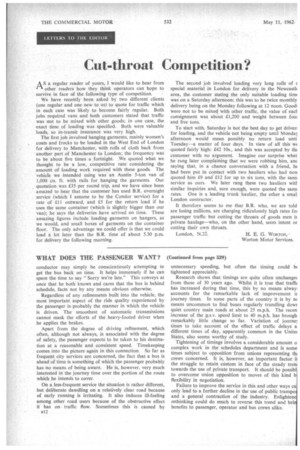Cut-throat Competition?
Page 38

If you've noticed an error in this article please click here to report it so we can fix it.
AS a regular reader of yours, I would like to hear from other readers how they think operators can hope to survive in face of the following type of competition.
We have recently been asked by two different clients (one regular and one new to us) to quote for traffic which in each case was likely to become fairly regular. Both jobs required vans and both customers stated that traffic was not to be mixed with other goods; in one case, the exact time of Loading was specified.. Both were valuable loads, so in-transit insurance was very high.
The first job involved hanging garments, mainly women's coats and frocks to be loaded in the West End of London for delivery to Manchester, with rolls of cloth back from another part of Manchester to London; the frequency was to be about five times a fortnight. We quoted what we thought to be a low, competitive rate consideringthe amount of loading work required with these goods. The vehicle we intended using was an Austin 5-ton van of 1,000 cu. ft. with rails for hanging the garments. Our quotation was £35 per round trip, and we have since been amazed to hear that the customer has used B.R. overnight service (which I assume to be the Condor service) for a rate of £11 outward, and £5 for the return load if he uses the same container (which is slightly bigger than our van); he says the deliveries have arrived on time. • These amazing figures include loading garments on hangers, as we would, and small boxes of garments on the container floor. The only advantage we could offer is that we could load a lot later than the B.R. time of about 5.30 p.m. for delivery the following morning.
The second job involved loading very long rolls of E special material in London for delivery in the Newcastl< area, the customer stating the only suitable loading tim( was on a Saturday afternoon; this was to be twice monthly delivery being on the Monday following at 12 noon. Good were not to be mixed with other traffic, the value of eacl consignment was about £1,200 and weight between fou] and five tons.
To start with, Saturday is not the best day to get driven for loading, and the vehicle not being empty until Monda] afternoon would mean possibly no return load unti Tuesday—a matter of four days. In view of all this: -quoted -quoted fairly high: £42 10s., and this was accepted by the customer with no argument. Imagine our surprise wher he rang later complaining that we were robbing him, an saying that, in a chance conversation• with a friend, he had been put in contact with two hauliers who had nos1 quoted him £9 and £12 for up to six tons, with the sanrie service as ours. We later rang these two hauliers witl similar inquiries and, sure enongh, were quoted the same rates. One is a leading trunk haulier, the other a smal London contractor.
It therefore seems to me that B.R. who, we are told are losing millions, are charging ridiculously high rates fo passenger traffic but cutting the throats of goods men ir private haulage—who, on the other hand, seem intent or cutting their own throats.
London, N.22. H. E. G. WORTON,-
Worton Motor Services.




































































































